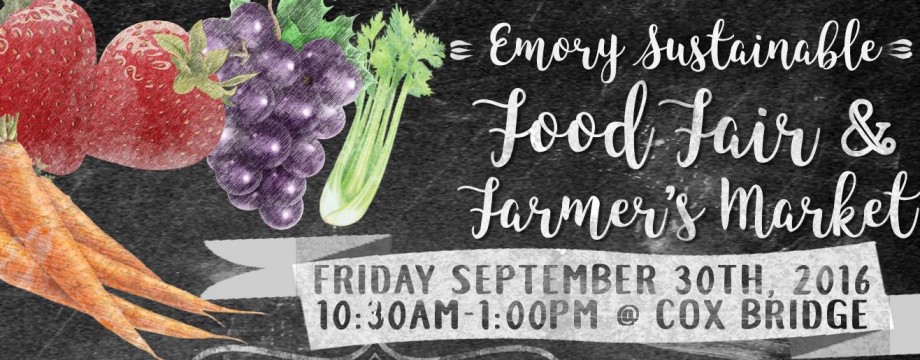The 11th Annual Emory Sustainable Food Fair
2016 Vendor Guide
Goals of the Fair:
- To promote local, farm fresh products grown in Atlanta, in neighboring counties and throughout Georgia.
- To provide a community that is committed to celebrating and advancing the Atlanta sustainable food movement.
- To provide an event to educate the Emory Community on the importance of sustainably produced food.
Fair Time and Location:
- Friday, September 30th, from 10:30-1PM.
- Setup Time: 9:15AM-10:15AM, Breakdown: 1:15-2:15PM
Contact Information:
- Logistics and General Fair Information: Angela Jiang, 2016 Sustainable Food Fair Assistant, emorysustainablefoodfair [at] gmail [dot] com
Product Guidelines:
- All products must be of good quality and of local origin, defined as being from Georgia or produced within bordering states (Tennessee, Alabama, Northern Florida, South Carolina, North Carolina). Priority is given to products grown, raised, produced or gathered by the vendor in Georgia. It is expected that all or most of the produce will be grown by the vendor. All produce not grown by the vendor must be from identifiable family farm(s) and must be clearly signed as to origin. Information on growing practices should be available.
- The Emory Sustainable Food Fair team makes the ultimate decision as to what may or may not be sold at the Fair.
- Handmade/locally crafted products made by the vendor are eligible for the Fair. We encourage products made from locally grown or gathered materials or having a connection to sustainable production. In order to be eligible as a product vendor at the Fair, it is expected that products have a step in its production that is local, or ingredients that are (but not limited to) being organic, Fair Trade, or humanely raised. Vendors must be able to explain in application how/why products contribute to the Atlanta Sustainable Food Movement, and how their organization’s/business’s values are committed to sustainability.
- The Fair gives preference to produce that is grown organically and sustainably. No genetically modified organisms are to be knowingly sold or included in products sold at the Fair.
- All vendors are responsible for complying with state and county food safety requirements.
- Preference is given to those vendors using local products in their ingredients.
Educational Focus
- The main purpose of the Fair is also to inform, educate, and to enrich the community on the local Sustainable Food Movement. That being said, it is expected for every vendor to have an educational component in addition to offerings.
- Some suggestions for educating the public include preparing an elevator speech about your sustainable practices in advance, providing signage/readily available information detailing on what makes your products sustainable, or choosing a particular focus topic and providing an activity/game that will engage students.
- For help on this component, please feel free to contact the Fair Assistant at emorysustainablefoodfair [at] gmail [dot] com.
Zero-Waste Event Guidelines
- Every year, the Emory Sustainable Food Fair is committed to being a Zero-Waste event. This means our event eliminates all polystyrene (Styrofoam) from the waste stream, provides both recycling and composting bins throughout the event space, and that no extra trash cans are ordered for the event. Any pre-existing trash cans are not available for use or are repurposed and clearly labeled as recycling or compost bins.
- For vendors, this means:
- No bottled water will be sold at the Fair. (Vendors are strongly encouraged to bring own refillable water bottles)
- Use compostable, paper, or plastic items only if disposables are needed. Compostable supplies can be ordered for free through us. Please contact the Fair Assistant for these supplies beforehand in at least week’s notice.
- No Styrofoam will be used.
- Attempt to exclude give-away items from the event, or provide sustainable items if necessary.
- Utilize electronic invitations (email sign ups), communication, and publicity to minimize paper.
Booth/Stand Guidelines
- Each vendor is responsible for bringing everything needed for the stand including tent, necessary equipment, tent frame, etc., as well as the setup and takedown of the stand at the beginning and end of the Fair. Chairs and two tables will be automatically provided.
- Each vendor must provide signage that identifies the booth and all products. Vendors are also strongly encouraged to accept a diversity of payment methods given this is a student-based community, especially methods like Venmo, and mobile credit card payments (Square).
- A canopy is recommended but not required. If a canopy is used, the vendor is required to tether all four corners with weights heavy enough to withstand strong wind gusts. Use of bricks, pegs or stakes is insufficient.
- Setup for the Fair must be completed fifteen minutes prior to Fair start at 10:15AM.
- Takedown for the Fair begins at 2:15 p.m.
- Vendors are to leave booths set up for the entire Fair even if product sells out. Packing up early gives patrons the mistaken impression that the Fair is over for the other vendors.
Samples
- Offering samples of farm produce or of crafted products to the public is strongly encouraged. The following guidelines must be followed: samples must be prepared using sanitary methods; convenience items such as toothpicks and napkins must be supplied as needed; samples must be kept in clean containers; waste disposal containers must be provided; and samples must be free.

